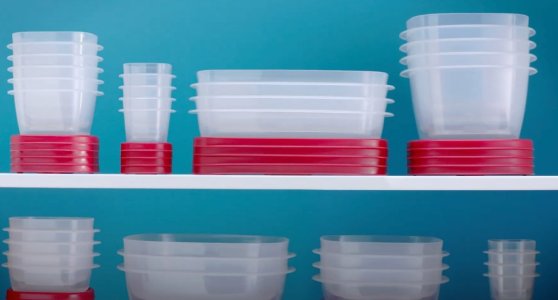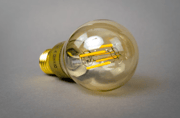Are your containers putting your health at risk? Here's what research and lawsuits are saying
By
Veronica E.
- Replies 0
If you’ve got a kitchen drawer full of plastic containers—some with lids that fit, some that don’t—you’re not alone.
For decades, brands like Rubbermaid and Ziploc have been trusted staples in American households.
Americans have relied on them to store leftovers, pack lunches, and even microwave quick meals.
But now, new lawsuits are calling those conveniences into question—and raising real concerns about microplastics leaching into our food.
At The GrayVine, we believe in staying informed about the products we use every day, especially when our health might be on the line.
With more research pointing to the potential dangers of microplastics, it may be time to take a closer look at what's sitting in our cabinets—and what might be getting into our meals.

What are the lawsuits about?
In April, two California women filed a class-action lawsuit against Newell Brands, which owns Rubbermaid.
They claim the company misled consumers by labeling its plastic containers as "microwave safe," "microwave reheatable," and "freezer safe"—even though those containers may release microplastics when used as directed.
Just days earlier, a similar lawsuit was filed against S.C. Johnson, the company behind Ziploc.
Both legal actions are being handled by the same California law firm and aim to represent millions of Americans who have purchased these products.
The concern is especially high for families packing lunches for children or older adults, both of whom may be more vulnerable to environmental toxins.
Also read: Your favorite gum might come with a hidden ingredient you don’t want to swallow
What are microplastics—and why should we be worried?
Microplastics are tiny plastic particles, often smaller than a grain of rice, that form as larger plastic items break down.
They’ve been found in oceans, drinking water, and now—according to studies—in our food.
A 2023 report in Environmental Science & Technology found that microwaving plastic containers can release significant amounts of these particles into the food we eat.
Though the plastics industry maintains that their products are safe, experts from groups like the Environmental Working Group urge caution.
Early research links microplastic exposure to potential health concerns, such as:
Children and seniors, in particular, may be more affected due to weaker or more sensitive immune systems.
Also read: Is your tea packed with microplastics? Here’s the shocking truth
Which containers are being questioned?
The lawsuits specifically name Rubbermaid’s TakeAlongs line, a popular collection of stackable containers used for everything from weekday lunches to holiday leftovers.
While the legal action targets these products, the concerns raised could apply to a wide range of plastic containers—especially those labeled for microwave or freezer use.
What could happen next?
Because these are class-action lawsuits, they could lead to widespread changes in labeling or manufacturing if the courts side with the plaintiffs or reach a settlement.
Consumers across the country may even be eligible for compensation.
However, class-action suits can take time, and while the science continues to develop, the burden of precaution largely falls on consumers in the meantime.
Also read: Is drinking bottled water bad for you? Scientists reveal surprising health risks you need to know
How to reduce your risk now
Here are a few simple ways to reduce your exposure to microplastics in the kitchen:
For many households, plastic has been a convenient go-to.
But as we learn more, it might be worth exploring alternatives like glass, stainless steel, or silicone—options that are increasingly available and often more durable.
Making small changes can go a long way toward protecting your health and the health of your loved ones.
Read next: Stop doing this now: Scientists reveal why it’s a bad idea to reuse plastic bottles and to-go containers

Have you made the switch to non-plastic containers? Are you concerned about microplastics in your home? Or do you have kitchen tips you'd like to share with The GrayVine community? Share your thoughts in the comments below. The more we learn from one another, the better choices we can make for a safer, healthier life!
For decades, brands like Rubbermaid and Ziploc have been trusted staples in American households.
Americans have relied on them to store leftovers, pack lunches, and even microwave quick meals.
But now, new lawsuits are calling those conveniences into question—and raising real concerns about microplastics leaching into our food.
At The GrayVine, we believe in staying informed about the products we use every day, especially when our health might be on the line.
With more research pointing to the potential dangers of microplastics, it may be time to take a closer look at what's sitting in our cabinets—and what might be getting into our meals.

Plastic food containers like Rubbermaid are now under scrutiny. Image Source: YouTube / Rubbermaid®.
What are the lawsuits about?
In April, two California women filed a class-action lawsuit against Newell Brands, which owns Rubbermaid.
They claim the company misled consumers by labeling its plastic containers as "microwave safe," "microwave reheatable," and "freezer safe"—even though those containers may release microplastics when used as directed.
Just days earlier, a similar lawsuit was filed against S.C. Johnson, the company behind Ziploc.
Both legal actions are being handled by the same California law firm and aim to represent millions of Americans who have purchased these products.
The concern is especially high for families packing lunches for children or older adults, both of whom may be more vulnerable to environmental toxins.
Also read: Your favorite gum might come with a hidden ingredient you don’t want to swallow
What are microplastics—and why should we be worried?
Microplastics are tiny plastic particles, often smaller than a grain of rice, that form as larger plastic items break down.
They’ve been found in oceans, drinking water, and now—according to studies—in our food.
A 2023 report in Environmental Science & Technology found that microwaving plastic containers can release significant amounts of these particles into the food we eat.
Though the plastics industry maintains that their products are safe, experts from groups like the Environmental Working Group urge caution.
Early research links microplastic exposure to potential health concerns, such as:
- Immune system suppression
- Digestive tract irritation
- Possible increased cancer risk
Children and seniors, in particular, may be more affected due to weaker or more sensitive immune systems.
Also read: Is your tea packed with microplastics? Here’s the shocking truth
Which containers are being questioned?
The lawsuits specifically name Rubbermaid’s TakeAlongs line, a popular collection of stackable containers used for everything from weekday lunches to holiday leftovers.
While the legal action targets these products, the concerns raised could apply to a wide range of plastic containers—especially those labeled for microwave or freezer use.
What could happen next?
Because these are class-action lawsuits, they could lead to widespread changes in labeling or manufacturing if the courts side with the plaintiffs or reach a settlement.
Consumers across the country may even be eligible for compensation.
However, class-action suits can take time, and while the science continues to develop, the burden of precaution largely falls on consumers in the meantime.
Also read: Is drinking bottled water bad for you? Scientists reveal surprising health risks you need to know
How to reduce your risk now
Here are a few simple ways to reduce your exposure to microplastics in the kitchen:
- Avoid microwaving plastic: Use glass or ceramic containers for heating food instead.
- Limit freezing in plastic: Freeze meals in glass or silicone when possible.
- Toss damaged containers: Scratched or cloudy plastics are more likely to shed microplastics.
- Hand wash when you can: Dishwashers use high heat, which can speed up plastic breakdown.
- Stay updated: Follow credible sources and health organizations for new research and safety guidance.
For many households, plastic has been a convenient go-to.
But as we learn more, it might be worth exploring alternatives like glass, stainless steel, or silicone—options that are increasingly available and often more durable.
Making small changes can go a long way toward protecting your health and the health of your loved ones.
Read next: Stop doing this now: Scientists reveal why it’s a bad idea to reuse plastic bottles and to-go containers
Key Takeaways
- Two California women are suing Newell Brands, the maker of Rubbermaid, for allegedly misleading consumers by labeling food containers as "microwave safe" and "freezer safe" despite potential microplastic contamination.
- The class-action suit claims that heating or freezing food in certain Rubbermaid containers may release microplastics, which have been linked to health risks such as immune issues, digestive problems, and possible cancer.
- The products under scrutiny include Rubbermaid's TakeAlongs line, commonly used for meal prep and leftover storage.
- While the plastics industry denies wrongdoing, the lawsuits seek compensation for all US consumers who may have been misled by the labeling and could prompt changes in packaging or materials.
Have you made the switch to non-plastic containers? Are you concerned about microplastics in your home? Or do you have kitchen tips you'd like to share with The GrayVine community? Share your thoughts in the comments below. The more we learn from one another, the better choices we can make for a safer, healthier life!






